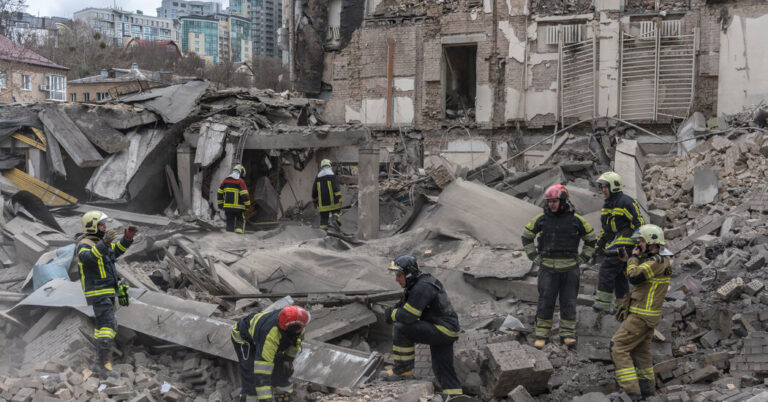Ukrainians have reacted with a mixture of concern and mockery to the narrative pushed by the Kremlin and Russian state media that Ukraine was behind the terrorist attack Friday on a Moscow concert hall, a claim made despite the Islamic State’s claim of responsibility.
For some Ukrainians — officials and citizens alike — the accusations were typical of a Kremlin playbook, blaming Ukraine to justify Moscow’s violence against their country. That includes the false claim that President Vladimir V. Putin of Russia used to begin the full-scale invasion of Ukraine, stating that the country was run by neo-Nazi leaders and that the aim of the war was to denazify the country.
“It’s typical for Russia,” Iryna Blakyta, 24, a resident of Kyiv, said on Monday, adding that she expected Mr. Putin to use the attack on the concert hall to rally Russians after more than two years of war. “He needs to mobilize people,” Ms. Blakyta said; “he needs to show who the enemy is.”
But worries about Mr. Putin’s next steps intensified on Monday morning in Kyiv, which was targeted by two ballistic missiles in broad daylight, the third air assault against the Ukrainian capital in five days. A university building in a central part of the city was reduced to rubble, and officials said at least 10 people had been injured.
The United States has confirmed the claim of responsibility by ISIS. And, on Monday night, Mr. Putin acknowledged that “radical Islamists” had executed the attack, but he also said Ukraine, backed by the West, could have masterminded the assault. Ukraine denied any involvement.
Ukrainian officials said Mr. Putin’s hints that Ukraine was involved were in line with the Kremlin’s longstanding practice of sowing disinformation to cover up the failings of its security services.
“Putin is a pathological liar,” Dmytro Kuleba, Ukraine’s foreign minister, wrote on X on Sunday, listing a series of bombings, murders and aggressive actions by Russia that he said were all cloaked in lies, including Russia’s illegal occupation of Crimea in 2014 and the downing of an airliner over Ukraine by Kremlin-backed fighters the same year.
“Do not let Putin and his henchmen dupe you,” Mr. Kuleba said.
Mr. Putin had earlier claimed in a statement about Friday’s attack, which killed at least 139 people, that the suspects “were heading toward Ukraine” after rampaging through the concert hall and that “according to preliminary information, a window was prepared for them on the Ukrainian side to cross the state border.” He stuck to this claim on Monday.
But Andriy Yusov, a representative of Ukraine’s military intelligence agency, ridiculed that claim over the weekend, saying that the Ukrainian-Russian border is an active combat zone that is heavily mined and guarded by both sides — making any crossing extremely complicated and dangerous.
“You don’t need to be a security expert” to understand this, Mr. Yusov said on Ukrainian television on Saturday.
He and other officials have pointed to Russia’s use of previous terror attacks to pursue political goals, including Mr. Putin using a deadly school siege in 2004 to consolidate political control over the country’s regions, abolishing direct governor elections until their restoration in 2012.
Some Ukrainian officials and analysts have said that Russia’s attempts to shift the blame to Ukraine could be used to lay the groundwork for expanding conscription. Russia has captured several cities and villages in Ukraine in recent months, but at considerable human cost, making it crucial to replenish its forces.
“Their only goal is to motivate more Russians to die in their senseless and criminal war against Ukraine,” Mr. Kuleba said.
Mykola Davidiuk, a Ukrainian political analyst, said Mr. Putin wanted to portray Ukraine as “a cruel enemy” linked to terrorism in order to stir up “aggressive attitudes toward Ukraine among Russian people.”
But he added that Ukrainians “don’t care” about this narrative because they have long been used to the Kremlin’s spurious portrayal of the conflict.
For now, people in Ukraine were left wondering whether Mr. Putin would use the terrorist attack to justify more deadly strikes against Ukraine. “He needs to constantly create some reasons, to keep things in control,” Ms. Blakyta said.
On Monday at around 10:30 a.m., residents of Kyiv were startled by a series of loud bangs that came less than a minute after air raid alerts blared across the capital, prompting people to run in the streets to get to shelter.
The Ukrainian Air Force said it had intercepted two ballistic missiles launched from Crimea, but falling debris destroyed a university gym. “Fortunately, there was nobody inside because it was closed,” Mayor Vitali Klitschko of Kyiv said as he visited the site of the strike.
Nearby, investigators were busy collecting and marking missile debris to analyze and determine exactly what kind of weapon was used. Because the missiles streaked into Kyiv quickly after the alarm sounded, there has been speculation that Russia used one of its powerful hypersonic missiles, which fly at several times the speed of sound.
All that remained of the university building that was hit was a huge pile of bricks, twisted metal structures and broken concrete slabs. Cars nearby were covered in a thick layer of dust, and local people watched as rescuers and firefighters cleared away the rubble, still in shock at what had happened.
“A column of smoke and dust rose, just like in a fog. Then, sirens, rescue vehicles, emergency services,” said Evelina Korzhova, 30, standing in her flower shop, which faced the destroyed building. The shop’s glass window had been shattered by the blast.
In his evening address on Sunday, President Volodymyr Zelensky of Ukraine said that over the past week Russia had launched some 190 missiles, 140 attack drones and 700 aerial bombs at Ukraine.
Oleksandra Mykolyshyn, Paul Sonne and Daria Mitiuk contributed reporting.

